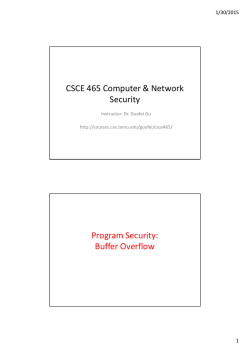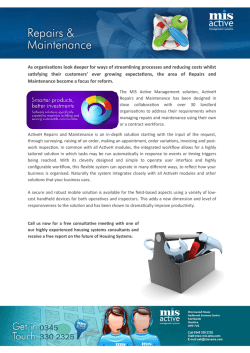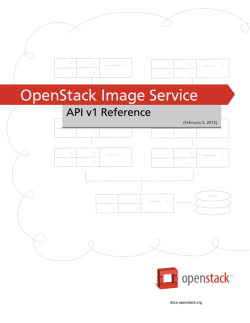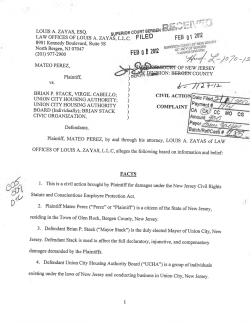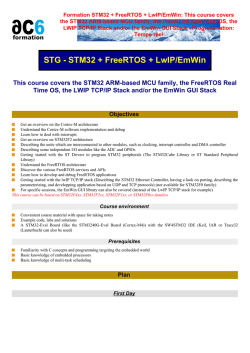
OpenStack Orchestration API v1 Reference
docs.openstack.org
Orchestration API Reference
February 5, 2015
OpenStack Orchestration API v1 Reference
Copyright © 2010-2015 OpenStack Foundation All rights reserved.
Licensed under the Apache License, Version 2.0 (the "License"); you may not use this file except in compliance with the License. You
may obtain a copy of the License at
http://www.apache.org/licenses/LICENSE-2.0
Unless required by applicable law or agreed to in writing, software distributed under the License is distributed on an "AS IS" BASIS,
WITHOUT WARRANTIES OR CONDITIONS OF ANY KIND, either express or implied. See the License for the specific language governing
permissions and limitations under the License.
ii
Orchestration API Reference
February 5, 2015
Table of Contents
1. Orchestration API v1 (CURRENT) ................................................................................. 1
1.1. API versions ...................................................................................................... 1
1.1.1. List versions ........................................................................................... 2
1.2. Stacks ............................................................................................................... 2
1.2.1. Create stack .......................................................................................... 4
1.2.2. Adopt stack ........................................................................................... 6
1.2.3. List stack data ....................................................................................... 7
1.2.4. Find stack .............................................................................................. 9
1.2.5. Show stack details ............................................................................... 10
1.2.6. Update stack ....................................................................................... 11
1.2.7. Delete stack ......................................................................................... 12
1.2.8. Preview stack ....................................................................................... 13
1.2.9. Abandon stack .................................................................................... 16
1.2.10. Snapshot stack ................................................................................... 18
1.2.11. List snapshots .................................................................................... 19
1.2.12. Show snapshot .................................................................................. 20
1.2.13. Restore snapshot ............................................................................... 22
1.2.14. Delete snapshot ................................................................................. 23
1.3. Stack actions .................................................................................................. 23
1.3.1. Suspend stack ...................................................................................... 24
1.3.2. Resume stack ....................................................................................... 25
1.4. Stack resources ............................................................................................... 25
1.4.1. Find stack resources ............................................................................. 26
1.4.2. List resources ....................................................................................... 27
1.4.3. Show resource data ............................................................................. 28
1.4.4. Show resource metadata ..................................................................... 29
1.4.5. Send a signal to a resource .................................................................. 30
1.4.6. List resource types ............................................................................... 31
1.4.7. Show resource schema ......................................................................... 32
1.4.8. Show resource template ...................................................................... 33
1.5. Stack events ................................................................................................... 33
1.5.1. Find stack events ................................................................................. 34
1.5.2. List stack events ................................................................................... 35
1.5.3. List resource events ............................................................................. 38
1.5.4. Show event details ............................................................................... 41
1.6. Templates ....................................................................................................... 41
1.6.1. Get stack template .............................................................................. 42
1.6.2. Validate template ................................................................................ 43
1.7. Build info ....................................................................................................... 43
1.7.1. Show build information ....................................................................... 44
1.8. Software configuration ................................................................................... 44
1.8.1. Create configuration ............................................................................ 46
1.8.2. Show configuration details ................................................................... 48
1.8.3. Delete config ....................................................................................... 50
1.8.4. List deployments .................................................................................. 51
1.8.5. Create deployment .............................................................................. 52
1.8.6. Show server configuration metadata .................................................... 53
1.8.7. Show deployment details ..................................................................... 56
iii
Orchestration API Reference
February 5, 2015
1.8.8. Update deployment ............................................................................. 57
1.8.9. Delete deployment .............................................................................. 59
iv
Orchestration API Reference
February 5, 2015
1. Orchestration API v1 (CURRENT)
Use a template language to orchestrate OpenStack services.
1.1. API versions
Method
GET
URI
Description
Lists information about all Orchestration API versions.
/
1
Orchestration API Reference
February 5, 2015
1.1.1. List versions
Method
GET
URI
Description
Lists information about all Orchestration API versions.
/
Normal response codes: 200
1.1.1.1. Request
This operation does not accept a request body.
1.1.1.2. Response
Example 1.1. List versions: JSON response
{
"versions": [
{
"status": "CURRENT",
"id": "v1.0",
"links": [
{
"href": "http://23.253.228.211:8000/v1/",
"rel": "self"
}
]
}
]
}
1.2. Stacks
Method
URI
Description
POST
/v1/{tenant_id}/stacks
Creates a stack.
POST
/v1/{tenant_id}/stacks
Creates a stack from existing resources.
GET
/v1/{tenant_id}/stacks{?status,
name,limit,marker,show_deleted,
sort_keys,sort_dir}
Lists active stacks.
GET
/v1/{tenant_id}/stacks/
{stack_name}
Finds the canonical URL for a specified stack.
GET
/v1/{tenant_id}/stacks/
{stack_name}/{stack_id}
Shows details for a specified stack.
PUT
/v1/{tenant_id}/stacks/
{stack_name}/{stack_id}
Updates a specified stack.
DELETE
/v1/{tenant_id}/stacks/
{stack_name}/{stack_id}
Deletes a specified stack.
POST
/v1/{tenant_id}/stacks/preview
Previews a stack.
DELETE
/v1/{tenant_id}/stacks/
{stack_name}/{stack_id}/abandon
Deletes a specified stack but leaves its resources intact,
and returns data describing the stack and its resources.
POST
/v1/{tenant_id}/stacks/
{stack_name}/{stack_id}/snapshots
Takes a snapshot of all the resources in the stack.
2
Orchestration API Reference
Method
February 5, 2015
URI
Description
GET
/v1/{tenant_id}/stacks/
{stack_name}/{stack_id}/snapshots
List the snapshots of a stack.
GET
/v1/{tenant_id}/stacks/
{stack_name}/{stack_id}/snapshots/{snapshot_id}
Show the details of a snapshot.
POST
/v1/{tenant_id}/stacks/
{stack_name}/{stack_id}/snapshots/{snapshot_id}
Restore a stack snapshot.
DELETE
/v1/{tenant_id}/stacks/
{stack_name}/{stack_id}/snapshots/{snapshot_id}
Delete a stack snapshot.
3
Orchestration API Reference
February 5, 2015
1.2.1. Create stack
Method
POST
URI
Description
Creates a stack.
/v1/{tenant_id}/stacks
Normal response codes: 201
1.2.1.1. Request
This table shows the URI parameters for the create stack request:
Name
{tenant_id}
Type
String
Description
The unique identifier of the tenant or account.
Example 1.2. Create stack: JSON request
{
"disable_rollback": true,
"stack_name": "teststack",
"template": {
"heat_template_version": "2013-05-23",
"description": "Simple template to test heat commands",
"parameters": {
"flavor": {
"default": "m1.tiny",
"type": "string"
}
},
"resources": {
"hello_world": {
"type":"OS::Nova::Server",
"properties": {
"key_name": "heat_key",
"flavor": {
"get_param": "flavor"
},
"image": "40be8d1a-3eb9-40de-8abd-43237517384f",
"user_data": "#!/bin/bash -xv\necho \"hello world\" > /
root/hello-world.txt\n"
}
}
}
}
}
1.2.1.2. Response
Example 1.3. Create stack: JSON response
{
"stack": {
"id": "3095aefc-09fb-4bc7-b1f0-f21a304e864c",
"links": [
{
4
Orchestration API Reference
February 5, 2015
"href": "http://192.168.123.200:8004/v1/
eb1c63a4f77141548385f113a28f0f52/stacks/simple_stack/3095aefc-09fb-4bc7-b1f0f21a304e864c",
"rel": "self"
}
]
}
}
5
Orchestration API Reference
February 5, 2015
1.2.2. Adopt stack
Method
POST
URI
Description
Creates a stack from existing resources.
/v1/{tenant_id}/stacks
Normal response codes: 201
1.2.2.1. Request
This table shows the URI parameters for the adopt stack request:
Name
{tenant_id}
Type
String
Description
The unique identifier of the tenant or account.
Example 1.4. Adopt stack: JSON request
{
"stack_name": "{stack_name}",
"template_url": "{template_url}",
"timeout_mins": "{timeout_mins}",
"adopt_stack_data": "{adopt_stack_data}"
}
1.2.2.2. Response
Example 1.5. Adopt stack: JSON response
{
"stack": {
"id": "5333af0c-cc26-47ee-ac3d-8784cefafbd7",
"links": [
{
"href": "http://192.168.123.200:8004/v1/
eb1c63a4f77141548385f113a28f0f52/stacks/simple_stack/5333af0c-cc26-47eeac3d-8784cefafbd7",
"rel": "self"
}
]
}
}
6
Orchestration API Reference
February 5, 2015
1.2.3. List stack data
Method
GET
URI
Description
/v1/{tenant_id}/stacks{?status,
name,limit,marker,show_deleted,
sort_keys,sort_dir}
Lists active stacks.
Normal response codes: 200
1.2.3.1. Request
This table shows the URI parameters for the list stack data request:
Name
{tenant_id}
Type
String
Description
The unique identifier of the tenant or account.
This table shows the query parameters for the list stack data request:
Name
status
Type
String
(Optional)
name
String
Description
Filters the stack list by the specified status. You can use this filter multiple times to filter by multiple statuses.
Filters the stack list by the specified name.
(Optional)
limit
String
Limits the number of stacks that appear on a page to this value. The
typical pattern of limit and marker is to make an initial limited request
(Optional) and then to use the ID of the last stack from the response as the marker parameter in a subsequent limited request.
marker
String
show_deleted
String
sort_keys
String
Specifies the ID of the last-seen stack. The typical pattern of limit and
marker is to make an initial limited request and then to use the ID of
(Optional) the last stack from the response as the marker parameter in a subsequent limited request.
Specifies whether to include deleted stacks in the stack list. Set to False
by default, so that deleted stacks are not shown in the results of the
(Optional) GET request unless you set this value to True.
(Optional)
sort_dir
String
(Optional)
Sorts the stack list by one of these attributes: name, status,
created_at, or updated_at.
The sort direction of the stack list. Either asc (ascending) or desc (descending).
This operation does not accept a request body.
1.2.3.2. Response
Example 1.6. List stack data: JSON response
{
"stacks": [
{
"creation_time": "2014-06-03T20:59:46Z",
"description": "sample stack",
"id": "3095aefc-09fb-4bc7-b1f0-f21a304e864c",
7
Orchestration API Reference
February 5, 2015
"links": [
{
"href": "http://192.168.123.200:8004/v1/
eb1c63a4f77141548385f113a28f0f52/stacks/simple_stack/3095aefc-09fb-4bc7-b1f0f21a304e864c",
"rel": "self"
}
],
"stack_name": "simple_stack",
"stack_status": "CREATE_COMPLETE",
"stack_status_reason": "Stack CREATE completed successfully",
"updated_time": ""
}
]
}
8
Orchestration API Reference
February 5, 2015
1.2.4. Find stack
Method
GET
URI
Description
Finds the canonical URL for a specified stack.
/v1/{tenant_id}/stacks/
{stack_name}
Also works with verbs other than GET, so you can perform PUT and DELETE operations on
a current stack. Set your client to follow redirects. Note that when redirecting, the request
method should not change, as defined in RFC2626. However, in many clients the default
behavior is to change the method to GET when you receive a 302 because this behavior is
ubiquitous in web browsers.
Normal response codes: 302
1.2.4.1. Request
This table shows the URI parameters for the find stack request:
Name
Type
Description
{tenant_id}
String
The unique identifier of the tenant or account.
{stack_name}
String
The name of a stack.
This operation does not accept a request body.
9
Orchestration API Reference
February 5, 2015
1.2.5. Show stack details
Method
GET
URI
Description
Shows details for a specified stack.
/v1/{tenant_id}/stacks/
{stack_name}/{stack_id}
Normal response codes: 200
1.2.5.1. Request
This table shows the URI parameters for the show stack details request:
Name
Type
Description
{tenant_id}
String
The unique identifier of the tenant or account.
{stack_name}
String
The name of a stack.
{stack_id}
String
The unique identifier for a stack.
This operation does not accept a request body.
1.2.5.2. Response
Example 1.7. Show stack details: JSON response
{
"stack": {
"capabilities": [],
"creation_time": "2014-06-03T20:59:46Z",
"description": "sample stack",
"disable_rollback": "True",
"id": "3095aefc-09fb-4bc7-b1f0-f21a304e864c",
"links": [
{
"href": "http://192.168.123.200:8004/v1/
eb1c63a4f77141548385f113a28f0f52/stacks/simple_stack/3095aefc-09fb-4bc7-b1f0f21a304e864c",
"rel": "self"
}
],
"notification_topics": [],
"outputs": [],
"parameters": {
"OS::stack_id": "3095aefc-09fb-4bc7-b1f0-f21a304e864c",
"OS::stack_name": "simple_stack"
},
"stack_name": "simple_stack",
"stack_status": "CREATE_COMPLETE",
"stack_status_reason": "Stack CREATE completed successfully",
"template_description": "sample stack",
"timeout_mins": "",
"updated_time": ""
}
}
10
Orchestration API Reference
February 5, 2015
1.2.6. Update stack
Method
PUT
URI
Description
Updates a specified stack.
/v1/{tenant_id}/stacks/
{stack_name}/{stack_id}
Normal response codes: 202
1.2.6.1. Request
This table shows the URI parameters for the update stack request:
Name
Type
Description
{tenant_id}
String
The unique identifier of the tenant or account.
{stack_name}
String
The name of a stack.
{stack_id}
String
The unique identifier for a stack.
Example 1.8. Update stack: JSON request
{
"template": {
"heat_template_version": "2013-05-23",
"description": "Create a simple stack",
"parameters": {
"flavor": {
"default": "m1.tiny",
"type": "string"
}
},
"resources": {
"hello_world": {
"type": "OS::Nova::Server",
"properties": {
"key_name": "heat_key",
"flavor": {
"get_param": "flavor"
},
"image": "40be8d1a-3eb9-40de-8abd-43237517384f",
"user_data": "#!/bin/bash -xv\necho \"hello world\" > /
root/hello-world.txt\n"
}
}
}
},
"parameters": {
"flavor": "m1.small"
}
}
11
Orchestration API Reference
February 5, 2015
1.2.7. Delete stack
Method
DELETE
URI
Description
Deletes a specified stack.
/v1/{tenant_id}/stacks/
{stack_name}/{stack_id}
Normal response codes: 204
1.2.7.1. Request
This table shows the URI parameters for the delete stack request:
Name
Type
Description
{tenant_id}
String
The unique identifier of the tenant or account.
{stack_name}
String
The name of a stack.
{stack_id}
String
The unique identifier for a stack.
This operation does not accept a request body.
12
Orchestration API Reference
February 5, 2015
1.2.8. Preview stack
Method
POST
URI
Description
/v1/{tenant_id}/stacks/preview
Previews a stack.
Normal response codes: 200
1.2.8.1. Request
This table shows the URI parameters for the preview stack request:
Name
{tenant_id}
Type
String
Description
The unique identifier of the tenant or account.
Example 1.9. Preview stack: JSON request
{
"disable_rollback": true,
"stack_name": "teststack",
"template": {
"heat_template_version": "2013-05-23",
"description": "Simple template to test heat commands",
"parameters": {
"flavor": {
"default": "m1.tiny",
"type": "string"
}
},
"resources": {
"hello_world": {
"type":"OS::Nova::Server",
"properties": {
"key_name": "heat_key",
"flavor": {
"get_param": "flavor"
},
"image": "40be8d1a-3eb9-40de-8abd-43237517384f",
"user_data": "#!/bin/bash -xv\necho \"hello world\" > /
root/hello-world.txt\n"
}
}
}
}
}
1.2.8.2. Response
Example 1.10. Preview stack: JSON response
{
"stack": {
"id": "None",
"parent": null,
"stack_name": "sample_stack",
"description": "Sample template description.",
"template_description": "Sample template description.",
"timeout_mins": 60,
13
Orchestration API Reference
February 5, 2015
"disable_rollback": true,
"capabilities": [],
"notification_topics": [],
"creation_time": "2014-02-19T16:04:56Z",
"updated_time": "2014-02-19T16:04:56Z",
"stack_status": "_",
"stack_status_reason": "",
"parameters": {
"AWS::Region": "ap-southeast-1",
"AWS::StackId":
"arn:openstack:heat::2e327e5e7fa94b25a44be66fd9d1ec4d:stacks/sample_stack/
None",
"AWS::StackName": "sample_stack",
"DBName": "wordpress",
"DBPassword": "******",
"DBRootPassword": "******",
"DBUsername": "******",
"InstanceType": "m1.small",
"KeyName": "heat_key",
"LinuxDistribution": "F17"
},
"links": [
{
"href": "http://10.0.2.15:8004/v1/
2e327e5e7fa94b25a44be66fd9d1ec4d/stacks/sample_stack/None",
"rel": "self"
}
],
"resources": [
{
"stack_name": "sample_stack",
"resource_name": "WikiDatabase-1",
"resource_type": "AWS::EC2::Instance",
"description": "",
"resource_action": "INIT",
"resource_status": "COMPLETE",
"resource_status_reason": "",
"physical_resource_id": "",
"required_by": [],
"resource_identity": {
"path": "/resources/WikiDatabase-1",
"stack_id": "None",
"stack_name": "sample_stack",
"tenant": "2e327e5e7fa94b25a44be66fd9d1ec4d"
},
"stack_identity": {
"path": "",
"stack_id": "None",
"stack_name": "sample_stack",
"tenant": "2e327e5e7fa94b25a44be66fd9d1ec4d"
},
"updated_time": "2014-02-19T16:04:56Z",
"metadata": {
"AWS::CloudFormation::Init": {
"config": {
"packages": {
"yum": {
"httpd": [],
"mysql": [],
"mysql-server": [],
14
Orchestration API Reference
February 5, 2015
"wordpress": []
}
},
"services": {
"systemd": {
"httpd": {
"enabled": "true",
"ensureRunning": "true"
},
"mysqld": {
"enabled": "true",
"ensureRunning": "true"
}
}
}
}
}
}
},
{
"other resources...": "other resources..."
}
]
}
}
15
Orchestration API Reference
February 5, 2015
1.2.9. Abandon stack
Method
DELETE
URI
Description
/v1/{tenant_id}/stacks/
{stack_name}/{stack_id}/abandon
Deletes a specified stack but leaves its resources intact,
and returns data describing the stack and its resources.
Normal response codes: 200
1.2.9.1. Request
This table shows the URI parameters for the abandon stack request:
Name
Type
Description
{tenant_id}
String
The unique identifier of the tenant or account.
{stack_name}
String
The name of a stack.
{stack_id}
String
The unique identifier for a stack.
This operation does not accept a request body.
1.2.9.2. Response
Example 1.11. Abandon stack: JSON response
{
"status": "COMPLETE",
"name": "g",
"dry_run": true,
"template": {
"outputs": {
"instance_ip": {
"value": {
"str_replace": {
"params": {
"username": "ec2-user",
"hostname": {
"get_attr": [
"server",
"first_address"
]
}
},
"template": "ssh username@hostname"
}
}
}
},
"heat_template_version": "2013-05-23",
"resources": {
"server": {
"type": "OS::Nova::Server",
"properties": {
"key_name": {
"get_param": "key_name"
},
"image": {
16
Orchestration API Reference
February 5, 2015
"get_param": "image"
},
"flavor": {
"get_param": "flavor"
}
}
}
},
"parameters": {
"key_name": {
"default": "heat_key",
"type": "string"
},
"image": {
"default": "fedora-amd64",
"type": "string"
},
"flavor": {
"default": "m1.small",
"type": "string"
}
}
},
"action": "CREATE",
"id": "16934ca3-40e0-4fb2-a289-a700662ec05a",
"resources": {
"server": {
"status": "COMPLETE",
"name": "server",
"resource_data": {},
"resource_id": "39d5dad7-7d7a-4cc8-bd84-851e9e2ff4ea",
"action": "CREATE",
"type": "OS::Nova::Server",
"metadata": {}
}
}
}
17
Orchestration API Reference
February 5, 2015
1.2.10. Snapshot stack
Method
POST
URI
Description
/v1/{tenant_id}/stacks/
{stack_name}/{stack_id}/snapshots
Takes a snapshot of all the resources in the stack.
Normal response codes: 200
1.2.10.1. Request
This table shows the URI parameters for the snapshot stack request:
Name
Type
Description
{tenant_id}
String
The unique identifier of the tenant or account.
{stack_name}
String
The name of a stack.
{stack_id}
String
The unique identifier for a stack.
This operation does not accept a request body.
1.2.10.2. Response
Example 1.12. Snapshot stack: JSON response
{
"id": "13c3a4b5-0585-440e-85a4-6f96b20e7a78",
"name": "vol_snapshot",
"status": "IN_PROGRESS",
"status_reason": null,
"data": null
}
18
Orchestration API Reference
February 5, 2015
1.2.11. List snapshots
Method
GET
URI
Description
/v1/{tenant_id}/stacks/
{stack_name}/{stack_id}/snapshots
List the snapshots of a stack.
Normal response codes: 200
1.2.11.1. Request
This table shows the URI parameters for the list snapshots request:
Name
Type
Description
{tenant_id}
String
The unique identifier of the tenant or account.
{stack_name}
String
The name of a stack.
{stack_id}
String
The unique identifier for a stack.
This operation does not accept a request body.
1.2.11.2. Response
Example 1.13. List snapshots: JSON response
{
"snapshots": [
{
"id": "7c4e1ef4-bf1b-41ab-a0c8-ce01f4ffdfa1",
"name": "vol_snapshot",
"status": "IN_PROGRESS",
"status_reason": null,
"data": null
}
]
}
19
Orchestration API Reference
February 5, 2015
1.2.12. Show snapshot
Method
GET
URI
Description
/v1/{tenant_id}/stacks/
{stack_name}/{stack_id}/snapshots/{snapshot_id}
Show the details of a snapshot.
Normal response codes: 200
1.2.12.1. Request
This table shows the URI parameters for the show snapshot request:
Name
Type
Description
{tenant_id}
String
The unique identifier of the tenant or account.
{stack_name}
String
The name of a stack.
{stack_id}
String
The unique identifier for a stack.
{snapshot_id}
String
The ID of a snapshot.
This operation does not accept a request body.
1.2.12.2. Response
Example 1.14. Show snapshot: JSON response
{
"snapshot": {
"id": "7c4e1ef4-bf1b-41ab-a0c8-ce01f4ffdfa1",
"name": "vol_snapshot",
"status": "COMPLETE",
"status_reason": "Stack SNAPSHOT completed successfully",
"data": {
"status": "COMPLETE",
"name": "stack_vol1",
"stack_user_project_id": "fffa11067b1c48129ddfb78fba2bf09f",
"environment": {
"parameters": {},
"resource_registry": {
"resources": {}
}
},
"template": {
"heat_template_version": "2013-05-23",
"resources": {
"volume": {
"type": "OS::Cinder::Volume",
"properties": {
"size": 1
}
}
}
},
"action": "SNAPSHOT",
"project_id": "ecdb08032cd042179692a1b148f6565e",
20
Orchestration API Reference
February 5, 2015
"id": "656452c2-e151-40da-8704-c844e69b485c",
"resources": {
"volume": {
"status": "COMPLETE",
"name": "volume",
"resource_data": {
"backup_id": "99108cf8-398f-461b-a043-bdceb7c9f572"
},
"resource_id": "3ab8cf79-807b-4c40-b743-0655f91e072f",
"action": "SNAPSHOT",
"type": "OS::Cinder::Volume",
"metadata": {}
}
}
}
}
}
21
Orchestration API Reference
February 5, 2015
1.2.13. Restore snapshot
Method
POST
URI
Description
/v1/{tenant_id}/stacks/
{stack_name}/{stack_id}/snapshots/{snapshot_id}
Restore a stack snapshot.
Normal response codes: 202
1.2.13.1. Request
This table shows the URI parameters for the restore snapshot request:
Name
Type
Description
{tenant_id}
String
The unique identifier of the tenant or account.
{stack_name}
String
The name of a stack.
{stack_id}
String
The unique identifier for a stack.
{snapshot_id}
String
The ID of a snapshot.
This operation does not accept a request body.
22
Orchestration API Reference
February 5, 2015
1.2.14. Delete snapshot
Method
DELETE
URI
Description
/v1/{tenant_id}/stacks/
{stack_name}/{stack_id}/snapshots/{snapshot_id}
Delete a stack snapshot.
Normal response codes: 204
1.2.14.1. Request
This table shows the URI parameters for the delete snapshot request:
Name
Type
Description
{tenant_id}
String
The unique identifier of the tenant or account.
{stack_name}
String
The name of a stack.
{stack_id}
String
The unique identifier for a stack.
{snapshot_id}
String
The ID of a snapshot.
This operation does not accept a request body.
1.3. Stack actions
Performs non-lifecycle operations on the stack. Specify the action in the request body.
Method
URI
Description
POST
/v1/{tenant_id}/stacks/
{stack_name}/{stack_id}/actions
Suspends a stack.
POST
/v1/{tenant_id}/stacks/
{stack_name}/{stack_id}/actions
Resumes a suspended stack.
23
Orchestration API Reference
February 5, 2015
1.3.1. Suspend stack
Method
POST
URI
Description
/v1/{tenant_id}/stacks/
{stack_name}/{stack_id}/actions
Suspends a stack.
Normal response codes: 201
1.3.1.1. Request
This table shows the URI parameters for the suspend stack request:
Name
Type
Description
{tenant_id}
String
The unique identifier of the tenant or account.
{stack_name}
String
The name of a stack.
{stack_id}
String
The unique identifier for a stack.
Example 1.15. Suspend stack: JSON request
{
"suspend": null
}
24
Orchestration API Reference
February 5, 2015
1.3.2. Resume stack
Method
POST
URI
Description
/v1/{tenant_id}/stacks/
{stack_name}/{stack_id}/actions
Resumes a suspended stack.
Normal response codes: 201
1.3.2.1. Request
This table shows the URI parameters for the resume stack request:
Name
Type
Description
{tenant_id}
String
The unique identifier of the tenant or account.
{stack_name}
String
The name of a stack.
{stack_id}
String
The unique identifier for a stack.
Example 1.16. Resume stack: JSON request
{
"resume": null
}
1.4. Stack resources
Method
URI
Description
GET
/v1/{tenant_id}/stacks/
{stack_name}/resources
Finds the canonical URL for the resource list of a specified
stack.
GET
/v1/{tenant_id}/stacks/
{stack_name}/{stack_id}/resources
{?nested_depth}
Lists resources in a stack.
GET
/v1/{tenant_id}/stacks/
{stack_name}/{stack_id}/resources/{resource_name}
Shows data for a specified resource.
GET
/v1/{tenant_id}/stacks/
{stack_name}/{stack_id}/resources/{resource_name}/metadata
Shows metadata for a specified resource.
POST
/v1/{tenant_id}/stacks/
{stack_name}/{stack_id}/resources/{resource_name}/signal
Sends a signal to a specified resource.
GET
/v1/{tenant_id}/resource_types
Lists the supported template resource types.
GET
/v1/{tenant_id}/resource_types/
{type_name}
Shows the interface schema for a specified resource type.
GET
/v1/{tenant_id}/resource_types/
{type_name}/template
Shows the template representation for a specified resource type.
25
Orchestration API Reference
February 5, 2015
1.4.1. Find stack resources
Method
GET
URI
Description
Finds the canonical URL for the resource list of a specified
stack.
/v1/{tenant_id}/stacks/
{stack_name}/resources
Normal response codes: 302
1.4.1.1. Request
This table shows the URI parameters for the find stack resources request:
Name
Type
Description
{tenant_id}
String
The unique identifier of the tenant or account.
{stack_name}
String
The name of a stack.
This operation does not accept a request body.
26
Orchestration API Reference
February 5, 2015
1.4.2. List resources
Method
GET
URI
Description
/v1/{tenant_id}/stacks/
{stack_name}/{stack_id}/resources
{?nested_depth}
Lists resources in a stack.
Normal response codes: 200
1.4.2.1. Request
This table shows the URI parameters for the list resources request:
Name
Type
Description
{tenant_id}
String
The unique identifier of the tenant or account.
{stack_name}
String
The name of a stack.
{stack_id}
String
The unique identifier for a stack.
This table shows the query parameters for the list resources request:
Name
nested_depth
Type
String
(Optional)
Description
Also includes resources from nested stacks up to nested_depth levels of recursion.
This operation does not accept a request body.
1.4.2.2. Response
This operation does not return a response body.
27
Orchestration API Reference
February 5, 2015
1.4.3. Show resource data
Method
GET
URI
Description
Shows data for a specified resource.
/v1/{tenant_id}/stacks/
{stack_name}/{stack_id}/resources/{resource_name}
Normal response codes: 200
1.4.3.1. Request
This table shows the URI parameters for the show resource data request:
Name
Type
Description
{tenant_id}
String
The unique identifier of the tenant or account.
{stack_name}
String
The name of a stack.
{stack_id}
String
The unique identifier for a stack.
{resource_name}
String
The name of a resource in the stack.
This operation does not accept a request body.
1.4.3.2. Response
This operation does not return a response body.
28
Orchestration API Reference
February 5, 2015
1.4.4. Show resource metadata
Method
GET
URI
Description
/v1/{tenant_id}/stacks/
{stack_name}/{stack_id}/resources/{resource_name}/metadata
Shows metadata for a specified resource.
Normal response codes: 200
1.4.4.1. Request
This table shows the URI parameters for the show resource metadata request:
Name
Type
Description
{tenant_id}
String
The unique identifier of the tenant or account.
{stack_name}
String
The name of a stack.
{stack_id}
String
The unique identifier for a stack.
{resource_name}
String
The name of a resource in the stack.
This operation does not accept a request body.
1.4.4.2. Response
Example 1.17. Show resource metadata: JSON response
{
"metadata": {
"some_key": "some_value",
"some_other_key": "some_other_value"
}
}
29
Orchestration API Reference
February 5, 2015
1.4.5. Send a signal to a resource
Method
POST
URI
Description
/v1/{tenant_id}/stacks/
{stack_name}/{stack_id}/resources/{resource_name}/signal
Sends a signal to a specified resource.
Some resources cannot receive signals. If you send them a signal, they return a 400 error response code. The contents of the POST request body depends on the resource to which you
send a signal.
Normal response codes: 200
1.4.5.1. Request
This table shows the URI parameters for the send a signal to a resource request:
Name
Type
Description
{tenant_id}
String
The unique identifier of the tenant or account.
{stack_name}
String
The name of a stack.
{stack_id}
String
The unique identifier for a stack.
{resource_name}
String
The name of a resource in the stack.
This operation does not accept a request body.
30
Orchestration API Reference
February 5, 2015
1.4.6. List resource types
Method
GET
URI
Description
/v1/{tenant_id}/resource_types
Lists the supported template resource types.
Normal response codes: 200
1.4.6.1. Request
This table shows the URI parameters for the list resource types request:
Name
{tenant_id}
Type
String
Description
The unique identifier of the tenant or account.
This operation does not accept a request body.
1.4.6.2. Response
This operation does not return a response body.
31
Orchestration API Reference
February 5, 2015
1.4.7. Show resource schema
Method
GET
URI
Description
/v1/{tenant_id}/resource_types/
{type_name}
Shows the interface schema for a specified resource type.
Normal response codes: 200
1.4.7.1. Request
This table shows the URI parameters for the show resource schema request:
Name
Type
Description
{tenant_id}
String
The unique identifier of the tenant or account.
{type_name}
String
The name of a resource type.
This operation does not accept a request body.
1.4.7.2. Response
Example 1.18. Show resource schema: JSON response
{
"attributes": {
"an_attribute": {
"description": "An attribute description ."
}
},
"properties": {
"a_property": {
"update_allowed": false,
"required": true,
"type": "string",
"description": "A resource description."
}
},
"resource_type": "OS::Heat::AResourceName"
}
32
Orchestration API Reference
February 5, 2015
1.4.8. Show resource template
Method
GET
URI
Description
/v1/{tenant_id}/resource_types/
{type_name}/template
Shows the template representation for a specified resource type.
Normal response codes: 200
1.4.8.1. Request
This table shows the URI parameters for the show resource template request:
Name
Type
Description
{tenant_id}
String
The unique identifier of the tenant or account.
{type_name}
String
The name of a resource type.
This operation does not accept a request body.
1.4.8.2. Response
This operation does not return a response body.
1.5. Stack events
Method
URI
Description
GET
/v1/{tenant_id}/stacks/
{stack_name}/events
GET
/v1/{tenant_id}/stacks/
Lists events for a specified stack.
{stack_name}/{stack_id}/events{?
resource_action,resource_status,
resource_name,resource_type,limit,
marker,sort_keys,sort_dir}
GET
/v1/{tenant_id}/stacks/
Lists events for a specified stack resource.
{stack_name}/{stack_id}/resources/{resource_name}/events{?
resource_action,resource_status,
resource_name,resource_type,limit,
marker,sort_keys,sort_dir}
GET
/v1/{tenant_id}/stacks/
{stack_name}/{stack_id}/resources/{resource_name}/events/
{event_id}
Finds the canonical URL for the event list of a specified
stack.
33
Shows details for a specified event.
Orchestration API Reference
February 5, 2015
1.5.1. Find stack events
Method
GET
URI
Description
Finds the canonical URL for the event list of a specified
stack.
/v1/{tenant_id}/stacks/
{stack_name}/events
Normal response codes: 302
1.5.1.1. Request
This table shows the URI parameters for the find stack events request:
Name
Type
Description
{tenant_id}
String
The unique identifier of the tenant or account.
{stack_name}
String
The name of a stack.
This operation does not accept a request body.
34
Orchestration API Reference
February 5, 2015
1.5.2. List stack events
Method
GET
URI
Description
/v1/{tenant_id}/stacks/
Lists events for a specified stack.
{stack_name}/{stack_id}/events{?
resource_action,resource_status,
resource_name,resource_type,limit,
marker,sort_keys,sort_dir}
Normal response codes: 200
1.5.2.1. Request
This table shows the URI parameters for the list stack events request:
Name
Type
Description
{tenant_id}
String
The unique identifier of the tenant or account.
{stack_name}
String
The name of a stack.
{stack_id}
String
The unique identifier for a stack.
This table shows the query parameters for the list stack events request:
Name
Type
resource_action
String
resource_status
String
resource_name
String
Description
Filters the event list by the specified resource_action. You can use this
filter multiple times to filter by multiple resource actions: CREATE,
(Optional) DELETE, UPDATE, ROLLBACK, SUSPEND, RESUME or ADOPT.
Filters the event list by the specified resource_status. You can use
this filter multiple times to filter by multiple resource statuses:
(Optional) IN_PROGRESS, COMPLETE or FAILED.
(Optional)
resource_type
String
limit
String
marker
String
sort_keys
String
Filters the event list by the specified resource_name. You can use this
filter multiple times to filter by multiple resource names.
Filters the event list by the specified resource_type. You can
use this filter multiple times to filter by multiple resource
(Optional) types: OS::Nova::Server, OS::Cinder::Volume,
OS::Neutron::Port, and so on.
Limits the number of events that appear on a page to this value. The
typical pattern of limit and marker is to make an initial limited re(Optional) quest and then to use the ID of the last event from the response as the
marker parameter in a subsequent limited request.
Specifies the ID of the last-seen event. The typical pattern of limit and
marker is to make an initial limited request and then to use the ID of
(Optional) the last event from the response as the marker parameter in a subsequent limited request.
Sorts the event list by: resource_type or created_at.
(Optional)
sort_dir
String
(Optional)
The sort direction of the event list. Which is asc (ascending) or desc
(descending).
This operation does not accept a request body.
35
Orchestration API Reference
February 5, 2015
1.5.2.2. Response
Example 1.19. List stack events: JSON response
{
"events": [
{
"resource_name": "port",
"event_time": "2014-07-23T08:14:47Z",
"links": [{
"href": "http://192.168.123.200:8004/v1/
dc4b074874244f7693dd65583733a758/stacks/aws_port/db467ed1-50b5-4a3eaeb1-396ff1d151c5/resources/port/events/474bfdf0-a450-46ec-a78a-0c7faa404073",
"rel": "self"
},
{
"href": "http://192.168.123.200:8004/v1/
dc4b074874244f7693dd65583733a758/stacks/aws_port/db467ed1-50b5-4a3eaeb1-396ff1d151c5/resources/port",
"rel": "resource"
},
{
"href": "http://192.168.123.200:8004/v1/
dc4b074874244f7693dd65583733a758/stacks/aws_port/db467ed1-50b5-4a3eaeb1-396ff1d151c5",
"rel": "stack"
}],
"logical_resource_id": "port",
"resource_status": "CREATE_FAILED",
"resource_status_reason": "NotFound: Subnet
f8a699d0-3537-429e-87a5-6b5a8d0c2bf0 could not be found",
"physical_resource_id": null,
"id": "474bfdf0-a450-46ec-a78a-0c7faa404073"
},
{
"resource_name": "port",
"event_time": "2014-07-23T08:14:47Z",
"links": [{
"href": "http://192.168.123.200:8004/v1/
dc4b074874244f7693dd65583733a758/stacks/aws_port/db467ed1-50b5-4a3eaeb1-396ff1d151c5/resources/port/events/66fa95b6-e6f8-4f05-b1af-e828f5aba04c",
"rel": "self"
},
{
"href": "http://192.168.123.200:8004/v1/
dc4b074874244f7693dd65583733a758/stacks/aws_port/db467ed1-50b5-4a3eaeb1-396ff1d151c5/resources/port",
"rel": "resource"
},
{
"href": "http://192.168.123.200:8004/v1/
dc4b074874244f7693dd65583733a758/stacks/aws_port/db467ed1-50b5-4a3eaeb1-396ff1d151c5",
"rel": "stack"
}],
"logical_resource_id": "port",
"resource_status": "CREATE_IN_PROGRESS",
"resource_status_reason": "state changed",
"physical_resource_id": null,
36
Orchestration API Reference
February 5, 2015
"id": "66fa95b6-e6f8-4f05-b1af-e828f5aba04c"
}
]
}
37
Orchestration API Reference
February 5, 2015
1.5.3. List resource events
Method
GET
URI
Description
/v1/{tenant_id}/stacks/
Lists events for a specified stack resource.
{stack_name}/{stack_id}/resources/{resource_name}/events{?
resource_action,resource_status,
resource_name,resource_type,limit,
marker,sort_keys,sort_dir}
Normal response codes: 200
1.5.3.1. Request
This table shows the URI parameters for the list resource events request:
Name
Type
Description
{tenant_id}
String
The unique identifier of the tenant or account.
{stack_name}
String
The name of a stack.
{stack_id}
String
The unique identifier for a stack.
{resource_name}
String
The name of a resource in the stack.
This table shows the query parameters for the list resource events request:
Name
Type
resource_action
String
resource_status
String
resource_name
String
Description
Filters the event list by the specified resource_action. You can use this
filter multiple times to filter by multiple resource actions: CREATE,
(Optional) DELETE, UPDATE, ROLLBACK, SUSPEND, RESUME or ADOPT.
Filters the event list by the specified resource_status. You can use
this filter multiple times to filter by multiple resource statuses:
(Optional) IN_PROGRESS, COMPLETE or FAILED.
(Optional)
resource_type
String
limit
String
marker
String
sort_keys
String
Filters the event list by the specified resource_name. You can use this
filter multiple times to filter by multiple resource names.
Filters the event list by the specified resource_type. You can
use this filter multiple times to filter by multiple resource
(Optional) types: OS::Nova::Server, OS::Cinder::Volume,
OS::Neutron::Port, and so on.
Limits the number of events that appear on a page to this value. The
typical pattern of limit and marker is to make an initial limited re(Optional) quest and then to use the ID of the last event from the response as the
marker parameter in a subsequent limited request.
Specifies the ID of the last-seen event. The typical pattern of limit and
marker is to make an initial limited request and then to use the ID of
(Optional) the last event from the response as the marker parameter in a subsequent limited request.
Sorts the event list by: resource_type or created_at.
(Optional)
sort_dir
String
(Optional)
The sort direction of the event list. Which is asc (ascending) or desc
(descending).
38
Orchestration API Reference
February 5, 2015
This operation does not accept a request body.
1.5.3.2. Response
Example 1.20. List resource events: JSON response
{
"events": [
{
"resource_name": "port",
"event_time": "2014-07-23T08:14:47Z",
"links": [{
"href": "http://192.168.123.200:8004/v1/
dc4b074874244f7693dd65583733a758/stacks/aws_port/db467ed1-50b5-4a3eaeb1-396ff1d151c5/resources/port/events/474bfdf0-a450-46ec-a78a-0c7faa404073",
"rel": "self"
},
{
"href": "http://192.168.123.200:8004/v1/
dc4b074874244f7693dd65583733a758/stacks/aws_port/db467ed1-50b5-4a3eaeb1-396ff1d151c5/resources/port",
"rel": "resource"
},
{
"href": "http://192.168.123.200:8004/v1/
dc4b074874244f7693dd65583733a758/stacks/aws_port/db467ed1-50b5-4a3eaeb1-396ff1d151c5",
"rel": "stack"
}],
"logical_resource_id": "port",
"resource_status": "CREATE_FAILED",
"resource_status_reason": "NotFound: Subnet
f8a699d0-3537-429e-87a5-6b5a8d0c2bf0 could not be found",
"physical_resource_id": null,
"id": "474bfdf0-a450-46ec-a78a-0c7faa404073"
},
{
"resource_name": "port",
"event_time": "2014-07-23T08:14:47Z",
"links": [{
"href": "http://192.168.123.200:8004/v1/
dc4b074874244f7693dd65583733a758/stacks/aws_port/db467ed1-50b5-4a3eaeb1-396ff1d151c5/resources/port/events/66fa95b6-e6f8-4f05-b1af-e828f5aba04c",
"rel": "self"
},
{
"href": "http://192.168.123.200:8004/v1/
dc4b074874244f7693dd65583733a758/stacks/aws_port/db467ed1-50b5-4a3eaeb1-396ff1d151c5/resources/port",
"rel": "resource"
},
{
"href": "http://192.168.123.200:8004/v1/
dc4b074874244f7693dd65583733a758/stacks/aws_port/db467ed1-50b5-4a3eaeb1-396ff1d151c5",
"rel": "stack"
}],
"logical_resource_id": "port",
"resource_status": "CREATE_IN_PROGRESS",
39
Orchestration API Reference
February 5, 2015
"resource_status_reason": "state changed",
"physical_resource_id": null,
"id": "66fa95b6-e6f8-4f05-b1af-e828f5aba04c"
}
]
}
40
Orchestration API Reference
February 5, 2015
1.5.4. Show event details
Method
GET
URI
Description
/v1/{tenant_id}/stacks/
{stack_name}/{stack_id}/resources/{resource_name}/events/
{event_id}
Shows details for a specified event.
Normal response codes: 200
1.5.4.1. Request
This table shows the URI parameters for the show event details request:
Name
Type
Description
{tenant_id}
String
The unique identifier of the tenant or account.
{stack_name}
String
The name of a stack.
{stack_id}
String
The unique identifier for a stack.
{resource_name}
String
The name of a resource in the stack.
{event_id}
String
The unique identifier of an event related to the resource in the stack.
This operation does not accept a request body.
1.5.4.2. Response
This operation does not return a response body.
1.6. Templates
Method
URI
Description
GET
/v1/{tenant_id}/stacks/
{stack_name}/{stack_id}/template
Gets a template for a specified stack.
POST
/v1/{tenant_id}/validate
Validates a specified template.
41
Orchestration API Reference
February 5, 2015
1.6.1. Get stack template
Method
GET
URI
Description
/v1/{tenant_id}/stacks/
{stack_name}/{stack_id}/template
Gets a template for a specified stack.
Normal response codes: 200
1.6.1.1. Request
This table shows the URI parameters for the get stack template request:
Name
Type
Description
{tenant_id}
String
The unique identifier of the tenant or account.
{stack_name}
String
The name of a stack.
{stack_id}
String
The unique identifier for a stack.
This operation does not accept a request body.
1.6.1.2. Response
This operation does not return a response body.
42
Orchestration API Reference
February 5, 2015
1.6.2. Validate template
Method
POST
URI
Description
Validates a specified template.
/v1/{tenant_id}/validate
Normal response codes: 200
1.6.2.1. Request
This table shows the URI parameters for the validate template request:
Name
{tenant_id}
Type
String
Description
The unique identifier of the tenant or account.
Example 1.21. Validate template: JSON request
{
"template_url": "{template_url}"
}
1.6.2.2. Response
Example 1.22. Validate template: JSON response
{
"Description": "{description}",
"Parameters": {
"{parameter_name}": {
"Label": "{label}",
"Type": "{type}",
"Description": "{description}",
"NoEcho": "{true|false}"
}
},
"ParameterGroups": [
{
"label": "{label}",
"description": "{description}",
"parameters": [
"param_name-1",
"param_name-2"
]
}
]
}
1.7. Build info
Method
GET
URI
Description
Shows build information for a heat deployment.
/v1/{tenant_id}/build_info
43
Orchestration API Reference
February 5, 2015
1.7.1. Show build information
Method
GET
URI
Description
Shows build information for a heat deployment.
/v1/{tenant_id}/build_info
Normal response codes: 200
1.7.1.1. Request
This table shows the URI parameters for the show build information request:
Name
{tenant_id}
Type
String
Description
The unique identifier of the tenant or account.
This operation does not accept a request body.
1.7.1.2. Response
Example 1.23. Show build information: JSON response
{
"api": {
"revision": "{api_build_revision}"
},
"engine": {
"revision": "{engine_build_revision}"
}
}
1.8. Software configuration
Method
URI
Description
POST
/v1/{tenant_id}/software_configs
Creates a software configuration.
GET
/v1/{tenant_id}/software_configs/
{config_id}
Shows details for a software configuration.
DELETE
/v1/{tenant_id}/software_configs/
{config_id}
Deletes a software configuration.
GET
/v1/{tenant_id}/
software_deployments
Lists all available software deployments.
POST
/v1/{tenant_id}/
software_deployments
Creates a software deployment.
GET
/v1/{tenant_id}/
software_deployments/metadata/{server_id}
Shows the deployment configuration metadata for a specified server.
GET
/v1/{tenant_id}/
software_deployments/
{deployment_id}
Shows details for a specified software deployment.
PUT
/v1/{tenant_id}/
software_deployments/
{deployment_id}
Updates a specified software deployment.
DELETE
/v1/{tenant_id}/
software_deployments/
{deployment_id}
Deletes a specified software deployment.
44
Orchestration API Reference
February 5, 2015
45
Orchestration API Reference
February 5, 2015
1.8.1. Create configuration
Method
POST
URI
Description
/v1/{tenant_id}/software_configs
Creates a software configuration.
Normal response codes: 200
1.8.1.1. Request
This table shows the URI parameters for the create configuration request:
Name
{tenant_id}
Type
String
Description
The unique identifier of the tenant or account.
Example 1.24. Create configuration: JSON request
{
"inputs": [
{
"default": null,
"type": "String",
"name": "foo",
"description": null
},
{
"default": null,
"type": "String",
"name": "bar",
"description": null
}
],
"group": "script",
"name": "a-config-we5zpvyu7b5o",
"outputs": [
{
"type": "String",
"name": "result",
"error_output": false,
"description": null
}
],
"config": "#!/bin/sh -x\necho \"Writing to /tmp/$bar\"\necho $foo > /
tmp/$bar\necho -n \"The file /tmp/$bar contains `cat /tmp/$bar` for server
$deploy_server_id during $deploy_action\" > $heat_outputs_path.result\necho \
"Written to /tmp/$bar\"\necho \"Output to stderr\" 1>&2",
"options": null
}
1.8.1.2. Response
Example 1.25. Create configuration: JSON response
{
"software_config": {
"inputs": [
46
Orchestration API Reference
February 5, 2015
{
"default": null,
"type": "String",
"name": "foo",
"description": null
},
{
"default": null,
"type": "String",
"name": "bar",
"description": null
}
],
"group": "script",
"name": "a-config-we5zpvyu7b5o",
"outputs": [
{
"type": "String",
"name": "result",
"error_output": false,
"description": null
}
],
"options": null,
"config": "#!/bin/sh -x\necho \"Writing to /tmp/$bar\"\necho $foo > /
tmp/$bar\necho -n \"The file /tmp/$bar contains `cat /tmp/$bar` for server
$deploy_server_id during $deploy_action\" > $heat_outputs_path.result\necho \
"Written to /tmp/$bar\"\necho \"Output to stderr\" 1>&2",
"id": "ddee7aca-aa32-4335-8265-d436b20db4f1"
}
}
47
Orchestration API Reference
February 5, 2015
1.8.2. Show configuration details
Method
GET
URI
Description
/v1/{tenant_id}/software_configs/
{config_id}
Shows details for a software configuration.
Normal response codes: 200
1.8.2.1. Request
This table shows the URI parameters for the show configuration details request:
Name
Type
Description
{tenant_id}
String
The unique identifier of the tenant or account.
{config_id}
String
The ID of the configuration.
This operation does not accept a request body.
1.8.2.2. Response
Example 1.26. Show configuration details: JSON response
{
"software_config": {
"inputs": [
{
"default": null,
"type": "String",
"name": "foo",
"description": null
},
{
"default": null,
"type": "String",
"name": "bar",
"description": null
}
],
"group": "script",
"name": "a-config-we5zpvyu7b5o",
"outputs": [
{
"type": "String",
"name": "result",
"error_output": false,
"description": null
}
],
"options": null,
"config": "#!/bin/sh -x\necho \"Writing to /tmp/$bar\"\necho $foo > /
tmp/$bar\necho -n \"The file /tmp/$bar contains `cat /tmp/$bar` for server
$deploy_server_id during $deploy_action\" > $heat_outputs_path.result\necho \
"Written to /tmp/$bar\"\necho \"Output to stderr\" 1>&2",
"id": "ddee7aca-aa32-4335-8265-d436b20db4f1"
}
48
Orchestration API Reference
February 5, 2015
}
49
Orchestration API Reference
February 5, 2015
1.8.3. Delete config
Method
DELETE
URI
Description
/v1/{tenant_id}/software_configs/
{config_id}
Deletes a software configuration.
Normal response codes: 204
1.8.3.1. Request
This table shows the URI parameters for the delete config request:
Name
Type
Description
{tenant_id}
String
The unique identifier of the tenant or account.
{config_id}
String
The ID of the configuration.
This operation does not accept a request body.
50
Orchestration API Reference
February 5, 2015
1.8.4. List deployments
Method
GET
URI
Description
Lists all available software deployments.
/v1/{tenant_id}/
software_deployments
Normal response codes: 200
1.8.4.1. Request
This table shows the URI parameters for the list deployments request:
Name
{tenant_id}
Type
String
Description
The unique identifier of the tenant or account.
This operation does not accept a request body.
1.8.4.2. Response
Example 1.27. List deployments: JSON response
{
"software_deployments": [
{
"status": "COMPLETE",
"server_id": "ec14c864-096e-4e27-bb8a-2c2b4dc6f3f5",
"config_id": "8da95794-2ad9-4979-8ae5-739ce314c5cd",
"output_values": {
"deploy_stdout": "Writing to /tmp/barmy\nWritten to /tmp/barmy
\n",
"deploy_stderr": "+ echo Writing to /tmp/barmy\n+ echo fu
\n+ cat /tmp/barmy\n+ echo -n The file /tmp/barmy contains fu for server
ec14c864-096e-4e27-bb8a-2c2b4dc6f3f5 during CREATE\n+ echo Written to /tmp/
barmy\n+ echo Output to stderr\nOutput to stderr\n",
"deploy_status_code": 0,
"result": "The file /tmp/barmy contains fu for server
ec14c864-096e-4e27-bb8a-2c2b4dc6f3f5 during CREATE"
},
"input_values": null,
"action": "CREATE",
"status_reason": "Outputs received",
"id": "ef422fa5-719a-419e-a10c-72e3a367b0b8"
}
]
}
51
Orchestration API Reference
February 5, 2015
1.8.5. Create deployment
Method
POST
URI
Description
Creates a software deployment.
/v1/{tenant_id}/
software_deployments
Normal response codes: 200
1.8.5.1. Request
This table shows the URI parameters for the create deployment request:
Name
{tenant_id}
Type
String
Description
The unique identifier of the tenant or account.
Example 1.28. Create deployment: JSON request
{
"status": "IN_PROGRESS",
"server_id": "ec14c864-096e-4e27-bb8a-2c2b4dc6f3f5",
"config_id": "8da95794-2ad9-4979-8ae5-739ce314c5cd",
"stack_user_project_id": "c024bfada67845ddb17d2b0c0be8cd79",
"action": "CREATE",
"status_reason": "Deploy data available"
}
1.8.5.2. Response
Example 1.29. Create deployment: JSON response
{
"software_deployment": {
"status": "IN_PROGRESS",
"server_id": "ec14c864-096e-4e27-bb8a-2c2b4dc6f3f5",
"config_id": "8da95794-2ad9-4979-8ae5-739ce314c5cd",
"output_values": null,
"input_values": null,
"action": "CREATE",
"status_reason": "Deploy data available",
"id": "ef422fa5-719a-419e-a10c-72e3a367b0b8"
}
}
52
Orchestration API Reference
February 5, 2015
1.8.6. Show server configuration metadata
Method
GET
URI
Description
Shows the deployment configuration metadata for a specified server.
/v1/{tenant_id}/
software_deployments/metadata/{server_id}
Use the group property to specify the configuration hook to which the pass the metadata
item.
Normal response codes: 200
1.8.6.1. Request
This table shows the URI parameters for the show server configuration metadata request:
Name
Type
Description
{tenant_id}
String
The unique identifier of the tenant or account.
{server_id}
String
The ID of the server for which to fetch configuration metadata.
This operation does not accept a request body.
1.8.6.2. Response
Example 1.30. Show server configuration metadata: JSON response
{
"metadata": [
{
"inputs": [
{
"default": null,
"type": "String",
"name": "foo",
"value": "fooooo",
"description": null
},
{
"default": null,
"type": "String",
"name": "bar",
"value": "baaaaa",
"description": null
},
{
"type": "String",
"name": "deploy_server_id",
"value": "ec14c864-096e-4e27-bb8a-2c2b4dc6f3f5",
"description": "ID of the server being deployed to"
},
{
"type": "String",
"name": "deploy_action",
"value": "CREATE",
"description": "Name of the current action being deployed"
},
{
53
Orchestration API Reference
February 5, 2015
"type": "String",
"name": "deploy_stack_id",
"value": "a/9bd57090-8954-48ab-bab9-adf9e1ac70fc",
"description": "ID of the stack this deployment belongs
to"
},
{
"type": "String",
"name": "deploy_resource_name",
"value": "deployment",
"description": "Name of this deployment resource in the
stack"
},
{
"type": "String",
"name": "deploy_signal_id",
"value": "http://192.168.20.103:8000/v1/signal/arn
%3Aopenstack%3Aheat%3A%3Ae2a84fbdaeb047ae8da4b503f3b69f1f%3Astacks%2Fa
%2F9bd57090-8954-48ab-bab9-adf9e1ac70fc%2Fresources%2Fdeployment?Timestamp=
2014-03-19T20%3A30%3A59Z&SignatureMethod=HmacSHA256&AWSAccessKeyId=
ca3571413e4a49998d580215517b3685&SignatureVersion=2&Signature=w6Iu
%2BNbg86mqwSOUf1GLuKPO7KaD82PiGpL4ig9Q1l4%3D",
"description": "ID of signal to use for signalling output
values"
}
],
"group": "script",
"name": "a-config-we5zpvyu7b5o",
"outputs": [
{
"type": "String",
"name": "result",
"error_output": false,
"description": null
}
],
"options": null,
"config": "#!/bin/sh -x\necho \"Writing to /tmp/$bar\"\necho $foo
> /tmp/$bar\necho -n \"The file /tmp/$bar contains `cat /tmp/$bar` for server
$deploy_server_id during $deploy_action\" > $heat_outputs_path.result\necho \
"Written to /tmp/$bar\"\necho \"Output to stderr\" 1>&2",
"id": "3d5ec2a8-7004-43b6-a7f6-542bdbe9d434"
},
{
"inputs": [
{
"default": null,
"type": "String",
"name": "foo",
"value": "fu",
"description": null
},
{
"default": null,
"type": "String",
"name": "bar",
"value": "barmy",
"description": null
},
{
54
Orchestration API Reference
February 5, 2015
"type": "String",
"name": "deploy_server_id",
"value": "ec14c864-096e-4e27-bb8a-2c2b4dc6f3f5",
"description": "ID of the server being deployed to"
},
{
"type": "String",
"name": "deploy_action",
"value": "CREATE",
"description": "Name of the current action being deployed"
},
{
"type": "String",
"name": "deploy_stack_id",
"value": "a/9bd57090-8954-48ab-bab9-adf9e1ac70fc",
"description": "ID of the stack this deployment belongs
to"
},
{
"type": "String",
"name": "deploy_resource_name",
"value": "other_deployment",
"description": "Name of this deployment resource in the
stack"
},
{
"type": "String",
"name": "deploy_signal_id",
"value": "http://192.168.20.103:8000/v1/signal/arn
%3Aopenstack%3Aheat%3A%3Ae2a84fbdaeb047ae8da4b503f3b69f1f%3Astacks%2Fa
%2F9bd57090-8954-48ab-bab9-adf9e1ac70fc%2Fresources%2Fother_deployment?
Timestamp=2014-03-19T20%3A30%3A59Z&SignatureMethod=HmacSHA256&AWSAccessKeyId=
7b761482f8254946bcd3d5ccb36fe939&SignatureVersion=2&Signature=giMfv%2BhrAw6y
%2FCMKQIQz2IhO5PkAj5%2BfP5YsL6rul3o%3D",
"description": "ID of signal to use for signalling output
values"
}
],
"group": "script",
"name": "a-config-we5zpvyu7b5o",
"outputs": [
{
"type": "String",
"name": "result",
"error_output": false,
"description": null
}
],
"options": null,
"config": "#!/bin/sh -x\necho \"Writing to /tmp/$bar\"\necho $foo
> /tmp/$bar\necho -n \"The file /tmp/$bar contains `cat /tmp/$bar` for server
$deploy_server_id during $deploy_action\" > $heat_outputs_path.result\necho \
"Written to /tmp/$bar\"\necho \"Output to stderr\" 1>&2",
"id": "8da95794-2ad9-4979-8ae5-739ce314c5cd"
}
]
}
55
Orchestration API Reference
February 5, 2015
1.8.7. Show deployment details
Method
GET
URI
Description
Shows details for a specified software deployment.
/v1/{tenant_id}/
software_deployments/
{deployment_id}
Normal response codes: 200
1.8.7.1. Request
This table shows the URI parameters for the show deployment details request:
Name
Type
Description
{tenant_id}
String
The unique identifier of the tenant or account.
{deployment_id}
String
The ID of the deployment.
This operation does not accept a request body.
1.8.7.2. Response
Example 1.31. Show deployment details: JSON response
{
"software_deployment": {
"status": "IN_PROGRESS",
"server_id": "ec14c864-096e-4e27-bb8a-2c2b4dc6f3f5",
"config_id": "3d5ec2a8-7004-43b6-a7f6-542bdbe9d434",
"output_values": null,
"input_values": null,
"action": "CREATE",
"status_reason": "Deploy data available",
"id": "06e87bcc-33a2-4bce-aebd-533e698282d3"
}
}
56
Orchestration API Reference
February 5, 2015
1.8.8. Update deployment
Method
PUT
URI
Description
Updates a specified software deployment.
/v1/{tenant_id}/
software_deployments/
{deployment_id}
Normal response codes: 200
1.8.8.1. Request
This table shows the URI parameters for the update deployment request:
Name
Type
Description
{tenant_id}
String
The unique identifier of the tenant or account.
{deployment_id}
String
The ID of the deployment.
Example 1.32. Update deployment: JSON request
{
"status": "COMPLETE",
"output_values": {
"deploy_stdout": "Writing to /tmp/baaaaa\nWritten to /tmp/baaaaa\n",
"deploy_stderr": "+ echo Writing to /tmp/baaaaa\n+ echo fooooo\n+
cat /tmp/baaaaa\n+ echo -n The file /tmp/baaaaa contains fooooo for server
ec14c864-096e-4e27-bb8a-2c2b4dc6f3f5 during CREATE\n+ echo Written to /tmp/
baaaaa\n+ echo Output to stderr\nOutput to stderr\n",
"deploy_status_code": 0,
"result": "The file /tmp/baaaaa contains fooooo for server
ec14c864-096e-4e27-bb8a-2c2b4dc6f3f5 during CREATE"
},
"status_reason": "Outputs received"
}
1.8.8.2. Response
Example 1.33. Update deployment: JSON response
{
"software_deployment": {
"status": "COMPLETE",
"server_id": "ec14c864-096e-4e27-bb8a-2c2b4dc6f3f5",
"config_id": "3d5ec2a8-7004-43b6-a7f6-542bdbe9d434",
"output_values": {
"deploy_stdout": "Writing to /tmp/baaaaa\nWritten to /tmp/baaaaa\
n",
"deploy_stderr": "+ echo Writing to /tmp/baaaaa\n+ echo fooooo\n
+ cat /tmp/baaaaa\n+ echo -n The file /tmp/baaaaa contains fooooo for server
ec14c864-096e-4e27-bb8a-2c2b4dc6f3f5 during CREATE\n+ echo Written to /tmp/
baaaaa\n+ echo Output to stderr\nOutput to stderr\n",
"deploy_status_code": 0,
"result": "The file /tmp/baaaaa contains fooooo for server
ec14c864-096e-4e27-bb8a-2c2b4dc6f3f5 during CREATE"
},
"input_values": null,
57
Orchestration API Reference
February 5, 2015
"action": "CREATE",
"status_reason": "Outputs received",
"id": "06e87bcc-33a2-4bce-aebd-533e698282d3"
}
}
58
Orchestration API Reference
February 5, 2015
1.8.9. Delete deployment
Method
DELETE
URI
Description
Deletes a specified software deployment.
/v1/{tenant_id}/
software_deployments/
{deployment_id}
Normal response codes: 204
1.8.9.1. Request
This table shows the URI parameters for the delete deployment request:
Name
Type
Description
{tenant_id}
String
The unique identifier of the tenant or account.
{deployment_id}
String
The ID of the deployment.
This operation does not accept a request body.
59
© Copyright 2026


